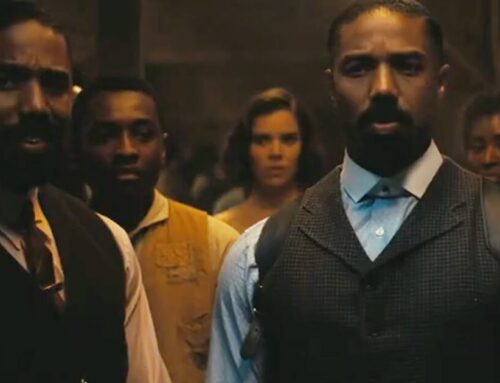I stumbled out of this film in a daze of horrified relief. The Pulitzer Prize-winning play by Tracy Letts, now a movie starring Meryl Streep and Julia Roberts, describes one of the most dysfunctional sagas in the annals of dysfunctional family sagas. It is not the bleak, claustrophobic womb of madness and despair that is O’Neill’s Tyrone family in “Long Day’s Journey into Night.” AUGUST:OSAGE COUNTY is more corn fed, out in the open, unforgiving, sun-scorched plains of Oklahoma, with shades of dark comedy that allow us to pull back from the brink every now and again, and laugh at the damned awfulness of it all.
The Weston family is led by its drug-addicted/cancer-riddled matriarch Violet with a cigarette in one hand, a bottle of pills in the other, and an acid remark apt to burn holes in psyches. Her relationship with her handsome, hard-drinking and worn-down husband is also on the rocks, and has been for a very long time. Sam Shepard is gray, and gauntly elegant in the part, and from the opening sequence we understand we’ll never be able to get to the bottom of the swamp that the relationship to his wife has become.
A family tragedy precipitates the gathering of the rest of the clan, beginning with the oldest of three daughters Barbara, Julia Roberts, as unadorned and angry as we’ve ever seen her, and trailing her own nuclear family of disasters: her fussy, professorial husband (Ewan McGregor) has left her for a younger woman, and their sullen teenage daughter (Abigail Breslin) can barely contain her contempt– especially for mom.
Juliette Lewis as the youngest daughter Karen sashays sweetly back to Osage County hoping for the best in a too-tight dress and a ne’er do well phony of a fiance in tow, perfectly played by Dermot Mulroney. Then there’s middle daughter Ivy (Julianne Nicholson) the one who stayed home to pick up the pieces. She’s pale and drawn, and quietly packing a volcano of resentment which Nicholson conveys with a surprising economy of means. The plot holds some of its cruelest twists of fate in store for her.
Rounding out the remainder of this Oylmpian ensemble is the always authentic Margo Martindale as Violet’s salt-of-the-earth but nonetheless hostile sister Mattie Fae, her stunted, unloved son “Little Charles” heartbreakingly played by Benedict Cumberbatch whose slightly askew features seem evidence of the emotional battering he’s taken, and finally Oscar winner Chris Cooper, as Mattie Fae’s husband Charles, the moral center of this family and this drama, who balances his performance with equal parts heart and soul, laced with sly humor, tenderness, and unsparing truth telling when nothing else will do. At one point at the dinner table, he jokes about taking a “big bite of fear”– it’s an unexpectedly uproarious moment; later, it’s clear, he’s the only one in the family able to take it all in –all the frustration, rage, sorrow, and unpalatable, dark secrets– spit it all out, and remain whole.
Which brings me to the heart of the film, a big family meal, served up gradually, scene by scene, as each of the characters interact in smaller portions– sisters and daughters, mothers and children, in-laws and insignificant others– gathered around a bottomless well of tragedy: breakdowns, blow ups, betrayals and a funeral. Director John Wells orchestrates this extraordinary cast of wildly variegated talents into a cohesive tonal entity, finding the comic beats beneath the overarching calamity of a family in deep generational distress.
It all bubbles over at one large dinner where Streep mercilessly baits and attempts to consume her family, one by one; it’s a sprawling, scenery-chewing moment for Streep (and there are many). Her Violet is vicious and plays like a dying animal in pain, lashing out at anyone who comes near– until Roberts’ Barbara can take no more. The ensuing explosion is a shocker, a titanic brawl of potent leading ladies; Roberts is up to the task. Her considerable bright magnetism and emotional transparency onscreen are here ultimately transmuted to a deeper shade of pain, darker than we’ve ever seen from the actress before. Somehow Streep seems always larger than whatever she is required to do, while Roberts has accomplished the almost unimaginable: I forgot it was Julia.
The film falters a bit with an awkward, muddled ending that feels tacked on to suggest something like hope. I didn’t need or want it. Cast and crew have served up a heady brew of family strife, and given us the tools to wonder and ache for the folks whose fates are in question, but who seem bent on surviving at least. As for me? I agree with Julia. It’s the “feel good” movie of the year. I feel so good that THAT family isn’t mine.






[…] “I stumbled out of this film in a daze of horrified relief.” – Joyce Kulhawik, Joyce’s Choices […]